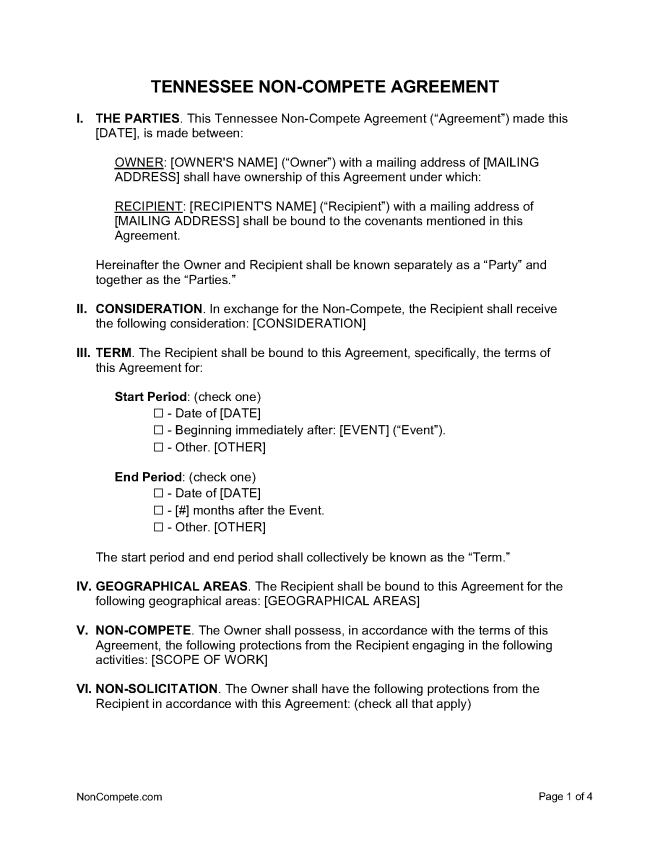A Tennessee non-compete agreement is used to protect the legitimate interests of a business by preventing a former employee or seller of a company from engaging in unfair competition. The law seeks to balance the public interest in freedom of trade with business interests and thus restricts non-competes that unduly limit someone’s ability to practice their profession. Non-competes are especially limited in medicine and law, though they may still be enforceable in some situations.
Table of Contents |
Are Non-Competes Enforceable in Tennessee?
Yes, a non-compete agreement can be enforceable if it serves to safeguard a “protectable interest,” includes reasonable time and geographic limits, and does not improperly apply to a restricted profession. (Hanger Prosthetics v. Kitchens (2009))
Employment Contracts vs. Sale of a Business
Non-compete agreements are treated with greater scrutiny in the context of an employer-employee relationship than in the sale of a business. (Baker v. Hooper (2001))
However, a non-compete agreement tied to an employment contract may be enforceable if found to be reasonable under the following standards (Murfreesboro Medical Clinic, P.A. v. Udom (2005)):
- Each party had something to give up and something to gain from the agreement (consideration)
- Non-enforcement of the agreement would pose a genuine risk of harm to the employer’s business
- The employee would not face undue economic hardship as a result of enforcement
- Enforcement of the agreement would not be against the public interest
Conversely, non-compete agreements that are part of the sale of a business are generally upheld. While both types of agreements are evaluated under the same standards, courts give greater deference to agreements arising in business transactions. (Greene Co.Tire, Inc. v. Spurlin (1960))
Restricted Professions
Covenants not to compete in professions that implicate ethical standards are viewed with the highest degree of scrutiny, but may still be narrowly enforceable in limited circumstances.
Physicians
Covenants not to compete involving physicians implicate important public policy considerations regarding access to care. (Murfreesboro Medical Clinic, P.A. v. Udom (2005)) However, under § 63-1-148, non-compete agreements are permitted in the medical profession so long as they:
- Are subject to a maximum term: two (2) years for covenants connected to employment agreements, or a “reasonable duration” in connection to the sale of a medical practice
- Are subject to geographical limits: for employment agreements, a ten-mile radius or the county in which the practice is located; for the sale of a practice, a “reasonable area”
Attorneys
Tennessee’s Rules of Professional Conduct prohibit non-compete agreements in the legal profession as such covenants “not only limits [a lawyer’s] professional autonomy but also limits the freedom of clients to choose a lawyer.” (Tenn. R. Sup. Ct. 5.6) This rule does not apply to covenants related to the sale of a law firm.
Protectable Interests
A valid non-compete agreement must serve to protect genuine business interests. If no real harm would be done to a business in the absence of a non-compete, then it will not be enforceable.
Protectable interests include:
- Trade secrets and confidential information (§ 47-25-1702(4))
- Goodwill in the sale of a business (Central Adjustment Bureau, Inc. v. Ingram (1984))
- Existing customers and contact lists (Hanger Prosthetics v. Kitchens (2009))
- Specialized training specific to a business (Hanger Prosthetics v. Kitchens (2009))
Terminating an Employee
Non-compete agreements can be enforced against an employee who was fired. However, the courts will consider the circumstances surrounding the termination. If an employer is found not to have acted in good faith, a court may decline to enforce the covenant. (Central Adjustment Bureau, Inc. v. Ingram (1984))
Burden of Proof
In most legal proceedings involving non-compete agreements, the plaintiff has the burden of proof. This usually means that the party seeking to enforce a non-compete must show that the agreement is valid. But if someone bound to a non-compete proactively seeks a judgment declaring the covenant not to be enforceable, the burden of proof shifts to them. (Jones v. United Propane Gas, Inc. (2009))
Continued Employment (consideration)
When an employee enters into a non-compete agreement around or at the time employment begins, the employment is considered adequate consideration to support the agreement. A non-compete signed later in the course of employment is also sufficient consideration, so long as the employment continues for a significant period of time thereafter. (Central Adjustment Bureau, Inc. v. Ingram (1984))
Maximum Term
Tennessee does not have specific guidelines as to the maximum allowable term for a non-compete agreement. The time limit must be reasonable and no greater than what is absolutely necessary for the protection of legitimate business interests. (Allright Auto Parks, Inc. v. Berry (1996))
Blue Penciling (allowed)
Tennessee courts will partially enforce non-competes to the extent that they are valid if the overall agreement is too expansive unless they have reason to believe that the party seeking to enforce the agreement is operating in bad faith. (Vantage Technology v. Cross (1999))
